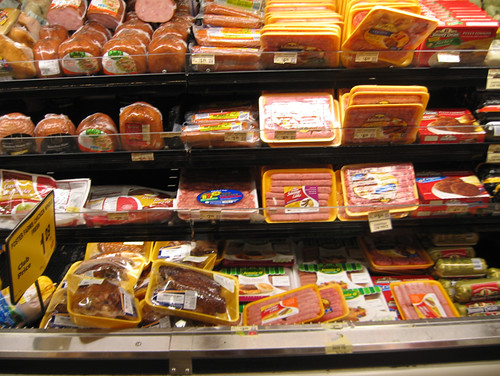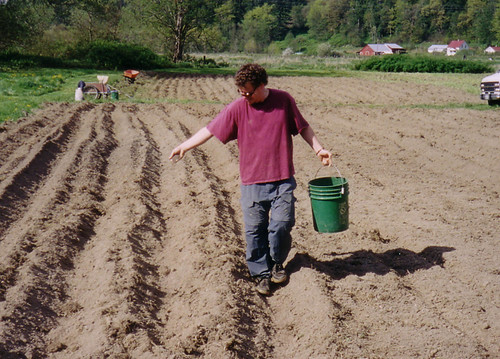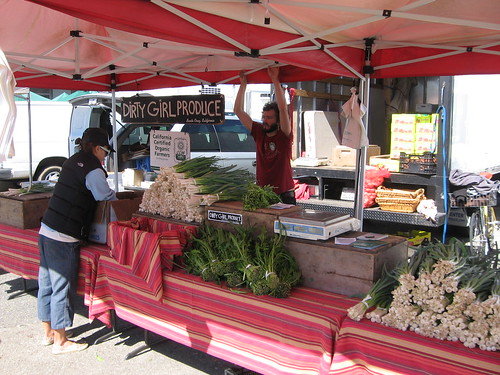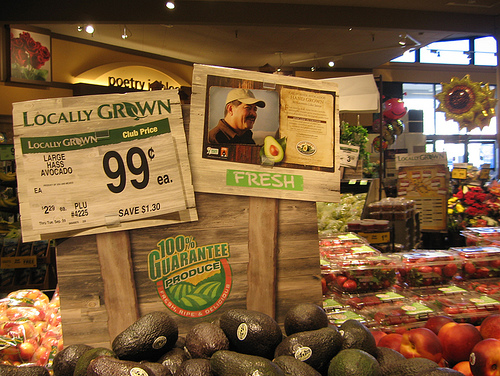In an article entitled The Corporate Co-Opt of “Local” author and senior researcher with the New Rules Project Stacy Mitchell describes a new trend in which a growing number of corporations are using the public’s growing desire for locally produced and grown products as a marketing and branding tool to increase their bottom line.
This is the logical next step in the cat and mouse game of We the People trying to stay one step ahead of corporate “annexation by imitation.” The word Natural has long since lost its meaning, followed closely by Organic, and most recently, Green. Reasonable minds disagree on whether the greening of industrial conglomerates nets positive on the fragile scale of global ecological balance. However, the worst thing we can do is to cede the terms completely to the lingual spin-meisters, thereby shopping and consuming ourselves toward a naturally supersized, organically mass-produced, sorta greenish, DEAD planet. Here’s a preview of the blockbuster coming soon to a grocery store near you, The Big Fat Local!
Thus reads the opening paragraph in Mitchell’s piece:
HSBC, one of the biggest banks on the planet, has taken to calling itself “the world’s local bank.” Winn-Dixie, a 500-outlet supermarket chain, recently launched a new ad campaign under the tagline “Local flavor since 1956.” The International Council of Shopping Centers, a global consortium of mall owners and developers, is pouring millions of dollars into television ads urging people to “Shop Local” — at their nearest mall. Even Wal-Mart is getting in on the act, hanging bright green banners over its produce aisles that simply say “Local.”
We immediately catch the drift here: Of course, technically speaking they’re not wrong. By the sheer magnitude of this banking institution, chances are there may very well be an HSBC branch right down the street from you. Ditto the shopping mall. And you can’t swing a dead cat by its tail without hitting a Wal-Mart. This rhetorical yoga is devilishly brilliant in its reduction of the word “local” to its broadest, most indiscriminate, almost zen-like state of meaning. Hell, the concept is so all-encompassing, I could write a tag line for the epitome of non-local, the airline industry: “United — Wherever you go, you’re local.”
Mitchell goes on to describe that most of the corporate local-washing is currently taking place within the context of food.
Frito-Lay’s new television commercials use farmers to pitch the company’s potato chips as local food, while Foster Farms, one of the largest producers of poultry products in the country, is labeling packages of chicken and turkey “locally grown”.
I had a hard time believing that this could be such a widespread practice. I hardly ever go to chain stores (lucky SF resident here), so I decided to ride on over to my “local” Safeway. Sure enough, the produce corner was peppered with “local” signage, almost gratuitously, as if to hammer home the point.
Local grapes…

Locally grown cantaloupes…

The avocados were not only local and organic, but “hand-grown” by Jaime the Grower…

Sure looks tasty, and I was totally tempted to just sink my teeth into one of those juicy peaches behind the avocados right then and there. I have to say that this is probably a good example of a big chain store doing as well as they could within the existing system: Farmers relatively close by get to sell their produce to a major buyer, not too much gas gets burned shipping this stuff around, and shoppers get to buy and eat fresh feelgood fruits and vegetables.
But when you take a closer look you realize that this produce has always been coming from California, even before they put the fancy signs up. Most likely it’s all grown on big commercial organic farms, and most of the money made from the sales of these luscious morsels ends up in the corporate headquarters of this Fortune 500 company.
It really is a mixed bag. As Stacy Mitchell points out:
In one way, all of this corporate local-washing is good news for local economy advocates: it represents the best empirical evidence yet that the grassroots movement for locally produced goods and independently owned businesses now sweeping the country is having a measurable impact on the choices people make.
I think this is the key point: Corporations are changing their tune in varying degrees of authenticity because people are tired of processed, pesticide-laden, fuel-wasting, soil depleting food, leaving the big guns no choice but to at least try to change their ways. Starting with visionaries such as Wendell Berry or Alice Waters, the movement to grow and eat real food has rippled far and wide, creating a new generation of family farms, farmers markets, and a whole range of other grassroots artisanship circumventing our dependence on mass-produced food from afar.
The numbers support the sentiment:
Signs that consumer preferences are trending local abound. Locally grown food has soared in popularity. The United States is now home to 4,385 active farmers markets, a third of which were started since 2000. Food co-ops and neighborhood greengrocers are on the rise. Driving is down, while data from several metropolitan regions show that houses located within walking distance of small neighborhood stores have held value better than those isolated in the suburbs where the nearest gallon of milk is a five-mile drive to Target.
While a lot more work needs to be done to much better define and qualify the concept of “local,” we’re headed in the right direction. If the Safeways and Wal-Marts of the world want to keep moving in the direction of buying and supporting locally made products we should give them credit where credit is due. However, we also shouldn’t forget that the very structure of big corporations is inherently unlocal, and no matter how much effort is put into branding and restructuring, a dollar spent at a chain store will never have the same positive impact on the community, our economic system, and the planetary ecosystem as a dollar spent at the farmers market or the nearby mom and pop store.
Studies have shown that $45 of every $100 spent at locally owned stores stays in the community, helping other local businesses and supporting government services, whereas only about $13 of every $100 spent in chain stores remains local.
I’ll leave you with a few impressions of some of the more clear choices we get to make on a daily basis, the ones that do not catapult us into the linguistic gray areas corporate marketeers love to tease us with. Or as Michael Pollan says, best to Shake the Hand that Feeds You.
Local

Not Local

.
Local

Not Local

.
Local

Not Local

.
Local

Not Local

.
Local

and definitely, Not Local

.








Here in Vermont we have a lot of options for local produce and meat – I stopped even looking at the word organic a few years back when I read a great article about how worthless the word had become as far as product labeling goes. I’m glad to hear that companies are responding to the demand for local/organic/healthier food choices, but upset that it’s motivated by the almighty dollar. Although, I guess we should be glad it’s happening at all.
I’m sure another term will be coined – shortly to be hijacked by the bigger companies to help sell their product. If consumer awareness is happening somewhere in there, I’m happy. I wish there were a solution to the problem of lower income families having access to local and healthy food.
http://hesaidandshesaid.wordpress.com/
Thanks for your thoughtful comment.
I would even venture to say that some of the managers and buyers at the big grocery stores are going local because of an honest desire to have the most tasty and healthy food in their stores. Who would want to discourage that? However, it doesn’t help small family farms because the big stores would never deal with such small accounts. I think as long as we keep encouraging people to go to farmers markets whenever they can and the supermarkets pick up the ones that can’t make it for whatever reason we’re doing as well as we can at this point. However, ultimately we’ll need to address the way capitalism works and is set up.